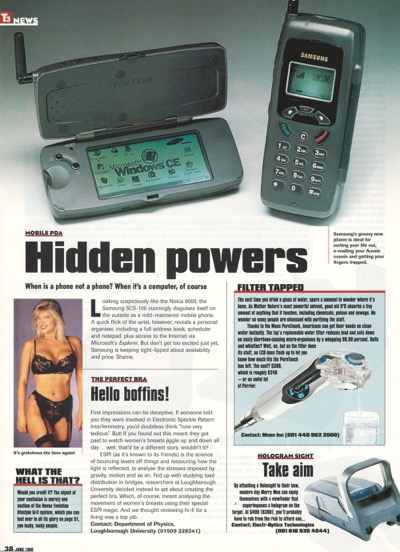T3 Magazine
I thought I’d showcase a few highlights and personal favourites here.
As I’m finding with many of my childhood memories, T3 doesn’t fair so well when viewed through a modern lens: it’s sexist, full of innuendo, and peppered with its own flavour of booth babes. Hopefully it’s possible to enjoy the content, recognising this is unacceptable in any industry.
Portables, Windows CE and Japan
Mobile computing has drawn me in, ever since I got my hands on Jonty’s Casio FX-700P in high school, and later when I bought myself a Psion Series 3. While Psions were my everyday devices, it was the first generations of Windows CE devices and early smartphones really captured my imagination—miniature laptops with internet connectivity, and even a few colour screens!

Samsung SCS-100, Issue 21

Casio Cassiopeia, Issue 36
I remember coveting Windows CE and Windows Pocket PC in all of its variants, like this one from NEC. Especially exciting were the early devices that combined Windows CE with smartphones like the Samsung SCS-100. Windows CE devices brought an explosion of exciting portable Psion-like devices, with keyboards that promised real productivity, like this one from NEC.


At the time I recall being incredibly impressed by the Rolodex REX which seemed like a beautifully creative device, fitting into a PCMCIA slot for charting and sync, and then providing a convenient portable device.


Apple
The 90s was a murky time for Apple, but they still enjoyed pretty good coverage in T3. First with a feature focusing on early concept work entitled ‘Apple Computers The Ones That Got Away…’, and later with the introduction of the iMac and iBook. These do the rounds on a pretty regular basis, but they still make me smile. The Twister concept is still one I’d love to have on my desk and isn’t worlds away from the iPad setup I have today.









There were also a number of device introductions and features during the years, from the Apple Macintosh Powerbook G3, to the iBook.

Powerbook G3, Issue 24

Apple Studio Display, Issue 24

iMac, Issue 38
Japan
A wonderful reminder that we were all going to have dedicated internet terminals at home:


Arguably these exist today in the form of things like the Google homethingy (what is this called?). Amstrad also produced the Emailer, and there were some very home oriented devices from Sony in the early 2000s.
There’s some fantastic wearable screens that look more like something from a Gibson novel than a true vision of the future.
This Canon-made wearable display:
https://archive.org/details/t3-issue-21/page/134/mode/2up
Flicking through the pages, I’m reminded by how much Japanese electronics dominated the consumer electronics space, with the Sony Vaio range of computers being a regular (and often paid-for) fixture.


Sony Vaio Advert, Issue 35
Also, don’t forget to the Toshiba Satellite.


Sony Aibo, Issue 24
Philips
If you’ve read some of my earlier posts, you’ll know that I’m a huge fan of the design work Philips were doing in the 90s.
Also, a time when Philips made consumer more than just smart lighting:

Ranging to webcams that really captured that wonderfully playful design aesthetic of the era, and in their concept work—I still want to see a modern cellphone that looks like the Shiva Devil (also, who would think to call a PDA ‘Devil’).



Palm
The competition for the handheld market in the UK was between Psion and Palm, and—even though it was from across the pond—Palm was still a big deal featuring in a number of articles.


Introducing the Palm V
Some things never change: I am still hunting for the perfect hybrid portable device and this accessory for a Palm Pilot still captures something that I’ve yet to see executed well with a modern cellphone. There’s something about this device that speaks to a light-weight computing experience (guaranteed by PalmOS), and a power conveyed by the keyboard:

In the UK, Psion was a pretty big deal in the portable computer space, featured alongside the still-amazing Sony Aibo:


Retro
One of the things that surprised me more than anything when looking over the pages of T3 is this article on retro computers—with ‘retro’ so clearly being an element of today’s computing experience, it’s all too easy to forget many of today’s retro devices were retro back in the 90s. Certainly that goes for the Electron, 800XL, TI99, ZX Spectrum +, ZX Spectrum, Commodore 64 and 64C in this article.


I think these passed me by as they were only recently ‘retro’ back then, and I was far more excited by the portable devices.
Mobile Communications and Bluetooth
Wonderful article on digital communications featuring Psions, Symbian devices, and Swatch pager watches, that Nokia phone from the Matrix:







This fantastic little article on video phones:


When bluetooth was a novelty:



Organisers, Issue 21



Sharp MC-G1 Communicator, Issue 21


Casio Hotbiz Watch, Issue 24

Issue 24



